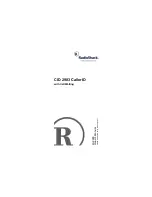
FCC Part 15 Radio Interference Statement
This equipment has been tested and found to comply with the limits for a
class B digital device, pursuant to Part 15 of the FCC Rules. These limits
are designed to provide reasonable protection against harmful interference in
a residential installation. This equipment generates, uses, and can radiate
harmful radio frequency, and if not installed and used in accordance with the
instructions, may cause harmful interference to radio communications.
However, there is no guarantee that interference will not occur in a particular
installation. If this equipment does cause harmful interference to radio or
television reception, which can be determined by turning the equipment off
and on, the user is encouraged to try to correct the interference by one or
more of the following measures: reorient or relocate the receiving antenna;
increase the separation between the equipment and receiver; connect the
equipment to an outlet on a circuit different from that to which the receiver
is connected; consult the dealer or an experienced radio/TV technician for
help.
Canadian Telecom Statement
Notice: The Canadian Industry and Science Canada label identifies certified equipment. This
certification means that the equipment meets certain telecommunications network protective,
operational and safety requirements. The department does not guarantee that the equipment will
operate to the user’s satisfaction.
Before installing this equipment, users should ensure that it is permissible to be connected to the
facilities of the local telecommunications company. The equipment must also be installed using
an acceptable method of connection. In some cases, the company’s inside wiring associated with
a single line individual service may be extended by means of a certified connector assembly
(telephone extension cord). The customer should be aware that compliance with the above con
ditions may not prevent degradation of service in some situations.
Repairs to certified equipment should be made by an authorized Canadian maintenance facility
designated by the supplier. Any repairs or alterations made by the user to this equipment, or
equipment malfunctions, may give the telecommunications company cause to request the user to
disconnect this equipment.
Caution: Users should not attempt to make such connections themselves, but should contact the
appropriate electric inspection authority, or electrician, as appropriate.
The load number (LN) assigned to each terminal device denotes the percentage of the total load
to be connected to a telephone loop which is used by the device to prevent overloading. The
termination on a loop may consist of any combination of devices subject only to the requirement that
the total of the load numbers of all the devices does not exceed 100.
22


















